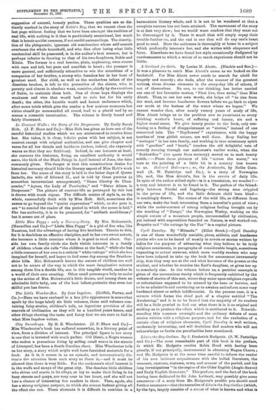A Garland for Girls. By Loniaa H. Alcott. (Blackie and
Son.)— it was a pleasure to catch Miss Alcott's name as we looked on the bookshelf. For Miss Alcott never needs to search far afield for tragedy and comedy ; she finds, after the manner of the greatest writers, these diverge elements in the every-day life of others, if not of themselves. No one, to our thinking, has better carried out one of her favourite mottos, "First live, then write," than Miss Alcott. Thus, to use her own words, she helps all "to rise from the mud, and become handsome flowers before we go hack to ripen our seeds at the bottom of the water where we began." We cannot wonder that, after nearly twenty years of study of life, Miss Alcott brings us to the problem now so prominent to every thinking worker's heart, of suffering and luxury, sin and a higher moral sense. We give hearty praise to the book, only con- fessing to a feeliog of disappointment at "stories," instead of one connected tale. The "Mayflowers'" experiences, with the happy touches of true girlish nature, are well done. Rosy finding her " savinges" in her own family, and working in true missionary spirit with "goodies" and "beads," touches the old delightful vein of comedy running through our authoress's earlier works, when the " Sakkerifise " (we quote from memory) moved us to such hearty mirth.—From these pictures of life "across the water," we turn to the painting of a little bit in a country less known to us. .Tialvard Halvorsen ; or, the Avalanche, by Nellie Corn- wall (S. W. Partridge and Co.), is a story of Norwegian life, and, like Miss Alcott's, lies in the events of daily life. In spite of the rather stilted style—is it a translation, we wonder ?— a very real interest is to be found in it. The pathos of the friend- ship between Nicolai and Ingeborg—the strong man crippled in the prime of life, and the little delicate child born blind— is touchingly drawn. The scenes of the wild life, so different from our own, make the book interesting from a traveller's point of view ; while the under-current of strong religious feeling brought out by the teaching of "Mayne," the Norwegian Wesley, working on the simple nature of a mountain people, untrammelled by civilisation, yet imbued with superstition founded on Nature, is well worked out. Bergette and "the cottage by the Fos" is a capital picture.






















































 Previous page
Previous page